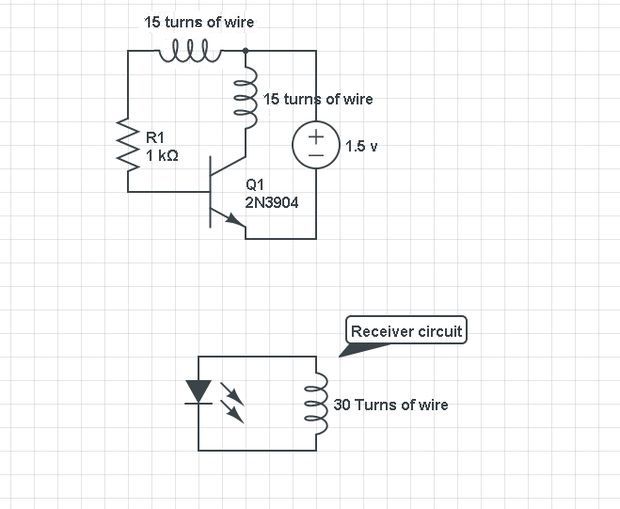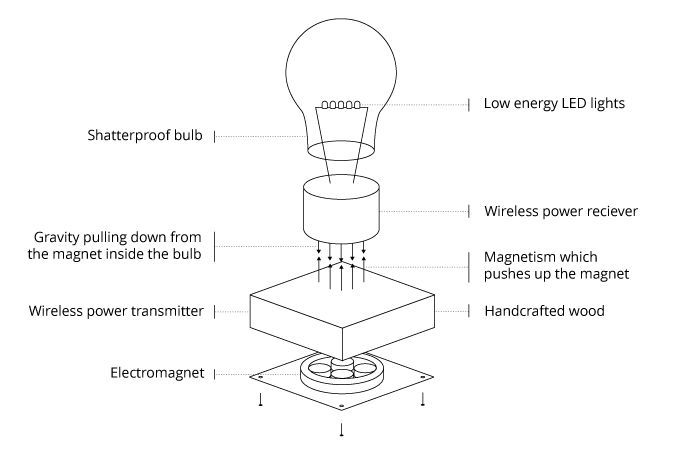Page 1 of 1
A hovering light bulb is my next project
Posted: Tue May 05, 2015 7:01 am
by burger2227
This Hoverboard-Inspired Light Bulb Uses Magnetic Levitation to Defy Gravity: cost over $150
 http://www.slate.com/blogs/the_eye/2015 ... src=fol_tw
http://www.slate.com/blogs/the_eye/2015 ... src=fol_tw
I already know how to run an LED light with a wireless transfer coil. Now I need to levitate it.

I'm going to assume I need a permanent magnet on the light bulb end.
Re: A hovering light bulb is my next project
Posted: Tue May 05, 2015 12:57 pm
by iamdenteddisk
helium or hydrogen can achieve aviation
I would suggest a copper wire with stainless tip(antenna) core for the receiver coil. this will increase input by a volt.
in all actuality all you need is the receiver side there is plenty of transmitter side coming from the transformers in the common home.
Re: A hovering light bulb is my next project
Posted: Fri May 08, 2015 11:07 am
by burger2227
Two simple coils can transfer enough power to an LED circuit. I have special chips that can be used as an oscillator, but the magnets will be a problem to levitate the bulb. I'm figuring an electromagnet in the base, but a permanent magnet in the bulb will just repel to one side and fall off.
From investigating it further, you need a special circuit to read the permanent magnetic force and adjust the electromagnetic force accordingly. Hall effect sensors would also be necessary. The setup turns the light bulb slowly too. That may be why it costs so much...
Once an electromagnet is in the base, I'm figuring the coil voltage could be also used to drive the LED's by oscillation too. The magnet would not need to always be on to make it hover perhaps.
As to just getting enough voltage from the air in a room, that would be a killer I would think...
Re: A hovering light bulb is my next project
Posted: Mon Jun 01, 2015 10:51 am
by iamdenteddisk
read thru it all burger, I am not trying to talk you out of the project but through it.
I know how negativity turns the eye away. but once you get through reading it you will see, it's not negativity at all but hope and concern.
after you understand my points made here, you probably will get it done pretty easily. I just wanted to prick your awareness a bit.
I don't think getting enough power will be a problem at all, more that, "you will most likely need a spark gap. (xeon flash bulb, like in a disposable camera). to work as a voltage limiter(shorting anything big enough to jump the gap). in the case lightening strikes near, to protect the rest of the circuitry.
"near", could be a range of 3 miles when dealing with lightening and coils." (see Tesla's patent on wireless transfer).
and still would need voltage regulator of some sort after the limiter.. unless you really protect it like in a "Faraday cage". And then also tune it to only produce the 3 or so volts you may need for the project.
the spark gap should be in parallel to the incoming power and one leg to ground, can use the ground pole in a polarized outlet. <but as you see that would make it impossible to have it free floating.
now you can still build it, but would have to maybe just instal a fuse link inside. this would still afford "free floating". I would want a fuse link for sure but also a micro switch in the bulb portion. so you can disable the circuit in bad weather, to keep from having to replace the fuse so often.
I really wouldn't worry about magnetic levity in it, unless you just want to fool around with the concept.
you could place the circuit inside a helium balloon and it would handle the levity, it may even be possible to get enough helium into a glass bulb to cause it to float,(they are normally pressurized, with a different gas anyway). the wireless power takes care of lighting it..
there is stray power coming from any coil being oscillated. also from any switch being switched. radio,tv signals fridge and heat relay's, cars when they start or running from an alternator with a bad filter". It is everywhere".
the whole trick would be to use filter's. you seem to have a great grasp on EET though, by that i mean the R/C time constant. there is also a L/C and L/R time constants too,just in case, IDK if you are aware, but they work pretty much the same.
using a few filters in a "bandpass" configuration will only allow what you want to reach your circuit. get to it.(as far as freq is concerned) though I say to still use a "spark gap, micro switch and a fuse link". because lightening creates a chaotic signal that will reach it no matter if you put it in a dresser drawer..
(THAT IS RECEIVER SIDE)
if you go on to make the (transmitter side) and not just"ambient(all around and through us)energy", you will want to protect it just the same.
use this info in your designs and I will feel confident, you will get it done.
then again what do I know??
Re: A hovering light bulb is my next project
Posted: Sun Oct 18, 2015 9:28 pm
by burger2227
Yes a coil could send the AC voltage to light up an LED or so.

The hard part is keeping the levitation even so the top part does not fall off the magnet.
Looks like 4 electromagnets keep the top magnet centered.




